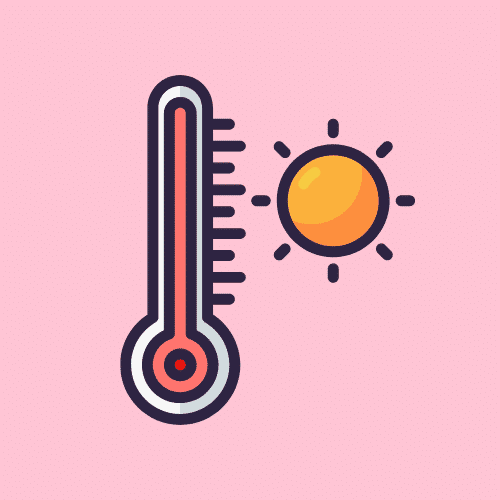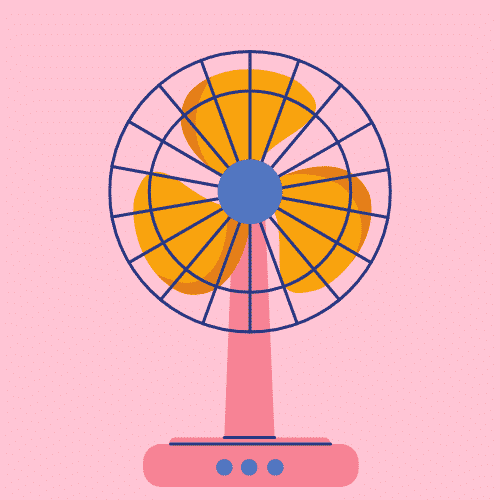A temperature of 25 – 30 degrees Celsius is too hot for guineapigs (77 – 86 degrees Fahrenheit), these temperatures can be too hot for your little pet. Guinea pigs are also susceptible to several diseases that can be fatal due to high temperatures.

Luckily, this article will cover the recommended temperatures safe for guinea pigs and the possible risks of a hot environment.
Taking care of guinea pigs may seem easy as all you’ll need is food, water, and a proper cage that they can call home. They are one of the cutest and most popular pets today. But to keep your little furry friends thriving and healthy, you should also keep in mind the temperature of your environment where guinea pigs can especially thrive.
Risks of a Hot Environment
Unlike most mammals, guinea pigs cannot sweat to release heat from their bodies. This makes them more sensitive to warm temperatures. This also means that more attention should be given to ensuring that their cage is around 18 – 22 degrees Celsius (64 – 72 degrees Fahrenheit).
Suppose that the summer season is around the corner; guinea pigs may be prone to heatstroke when left unchecked. It only takes around 10 – 15 minutes of exposure to intense heat, severely affecting your pet’s health. Here are some of the symptoms that you should watch out for in caring for your guinea pigs:
Drooling and Dehydration
Guinea pigs may salivate as a way to cool their bodies. They do this since the saliva from guinea pigs is significant and is used to cool the air around them once it evaporates. In cases such as this, it is essential to give them enough water to help them lower their body temperature.
Fatigue
If humans get quickly tired of the scorching heat, guinea pigs are twice as likely to experience their harmful effects. To check if your pet is getting too restless, you can monitor your pet’s heart rate to ensure that they are doing well under the sun. You should immediately move your pet to a safer area if they act more tired than usual.
Convulsions
Body pain such as convulsions and seizures are common symptoms experienced by guinea pigs before a heatstroke. Additionally, you may notice your little furries panting under high temperatures. They may also have trouble with their mobility and will appear to be stretching or learning more on their side.
Always remember to be on high alert, especially during the summer and if you live in a tropical climate. It is still highly recommended that you bring your guinea pig to your veterinarian immediately for the best medical assistance whenever these symptoms arise.
Now that you know the signs to watch for to keep your guinea pigs safe let’s take a look at the steps you can take to keep your cute critters safe from heatstroke.
How Do I Keep My Guinea Pigs From Having a Heatstroke?
Here are some tips that you can use to manage the heat for your guinea pigs:
Keep Them Hydrated
Since your little furries cannot cool themselves through sweating, keeping them hydrated becomes twice as important to regulate their temperature. Make sure that your guinea pigs always have a water supply ready nearby.
Placing Water Bottles Inside Their Cage
You can place cold water bottles in your refrigerator or freezer to keep them cage-free from the heat. Make sure that you wrap your water bottle using a towel to prevent unwanted moisture from leaking through the cage. Your pets will now enjoy their miniaturized air cooling system.
Using Damp Towels
Additionally, using damp towels themselves can also repel the scorching heat. Simply place the wet towels on top of the cage to lessen the heat. Aside from this, you can also use clips to hang your damp towels, covering the sunlight or sources of heat from entering the cage.
Using Electronic Appliances
Should the heat persist, you can always resort to adding more electronic appliances to cool the area. Turning on your air conditioner or adding more indoor fans is a great way to reduce the heat. However, keep in mind that the air should be indirectly hitting the cage to circulate the air movement.

Moving Your Guinea Pig to a Shaded Location
If all else fails and your guinea pig is still experiencing the intense heat, it would be best to transfer them to a cooler or shaded area. You could also give your little critters a small bath if the heat is too much. Just make sure that you use lukewarm water, as cold water may shock your pet. Bathe your guinea pig for around 10 minutes and gradually cover their body using a towel.
- Agouti Guinea Pigs
- Hay Mites On Guinea Pigs – Detecting And Treating A Mite Infection
- Can Guinea Pigs Eat Newspaper?
- Dandruff on Guinea Pigs: What Causes It and How to Treat It
Conclusion
Guinea pigs are susceptible to high temperatures and need to be monitored closely to keep them healthy. Temperatures ranging from 25 degrees Celsius (77 degrees Fahrenheit) or higher are considered too hot for guinea pigs. They are more prone to heatstroke and are fatal in most cases as their bodies do not have a natural cooling system.
Hydration is the key to keeping them healthy. Don’t forget to keep your guinea pigs hydrated and protected from direct sunlight. It would help if you also had good air circulation in your environment to lessen the risk of heatstroke. If your guinea pig is adversely affected by the heat, please consult your veterinarian immediately.

Doctor of Veterinary Medicine (D.V.M.) at Nation Taiwan University,Master of Science (M.S.) in Biomedical Engineering at National Taiwan University of Science and Technology




